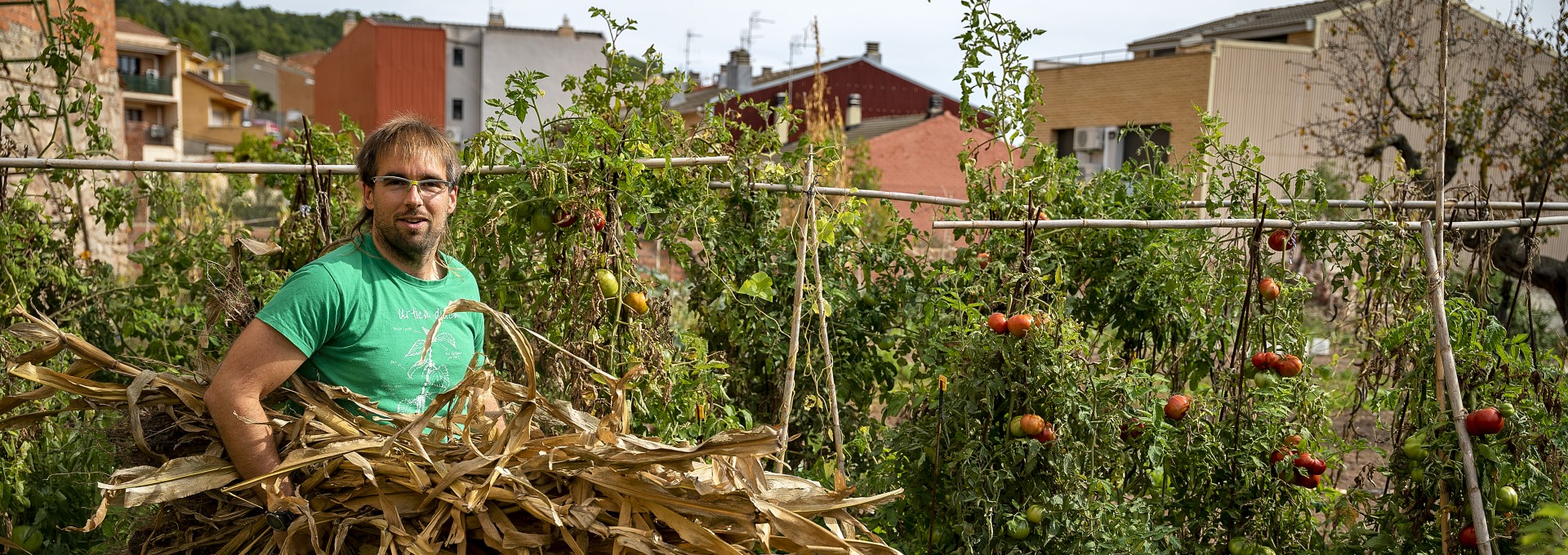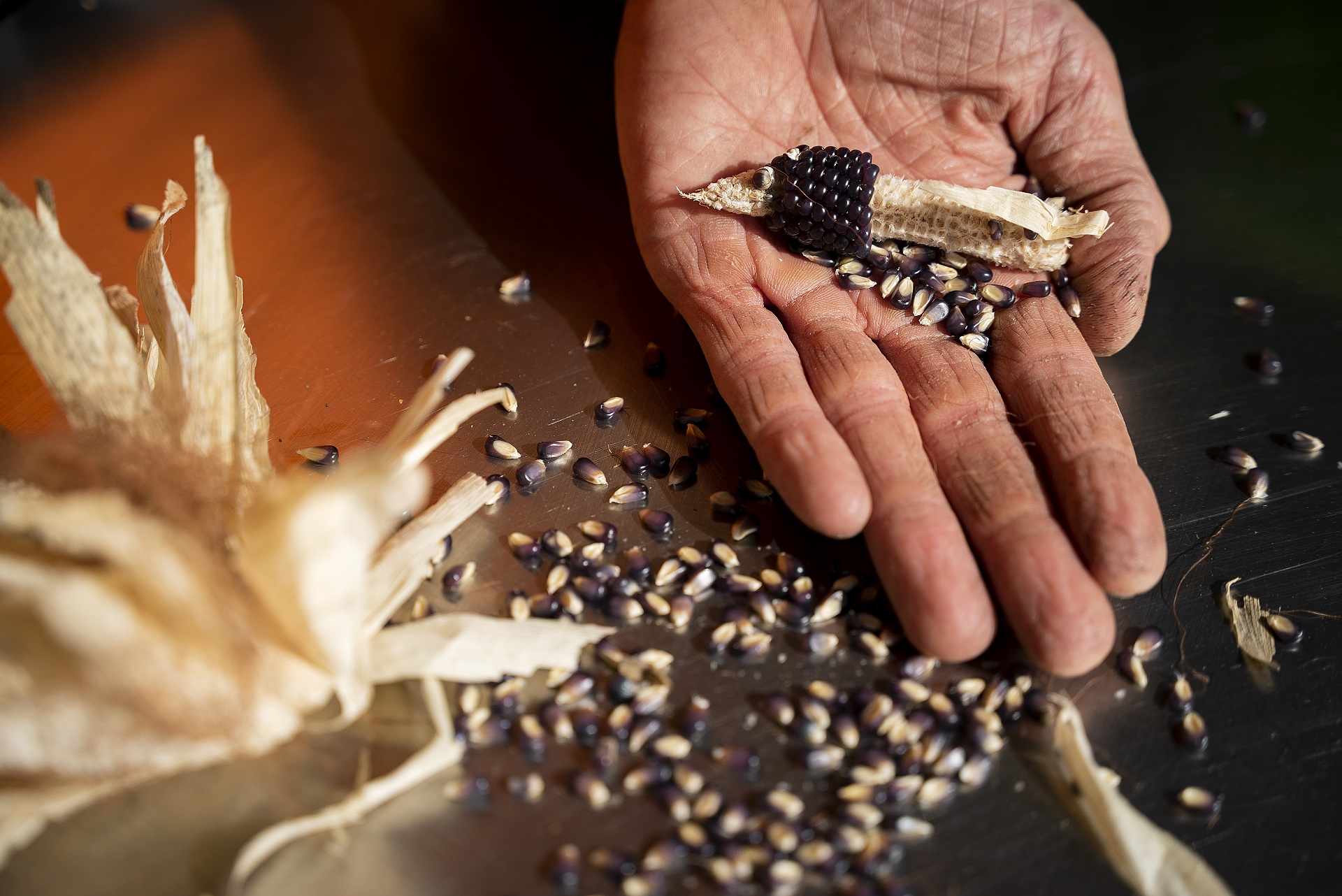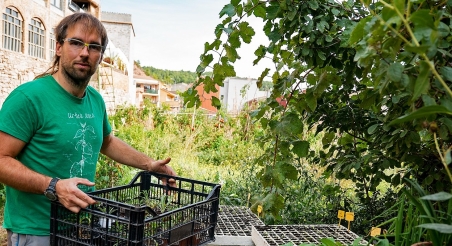Marc Talavera (Igualada, 1988) is the president of the Eixarcolant collective, a cooperative entity dedicated to the recovery of traditional agricultural varieties and edible wild species. Based in Jorba, the project aims to contribute to building an agri-food and socio-economic model that generates a positive impact across the entire region, organizing diverse activities to achieve this goal.
We discuss this calmly with the doctor in biology and expert in scientific communication, an indisputable reference in ethnobotany and agroecology in Catalonia.
You are one of the protagonists of the first of the 'BCN Smart Rural Stories', a series of short films created to give voice to those leading the way toward a healthier and more sustainable agri-food system in the Barcelona region. Can you explain what Eixarcolant is?
Eixarcolant is a sociopolitical movement in which we advocate for the recovery of forgotten plants to help transform the agri-food model, specifically in how we produce, distribute, and consume food. We aim to return to a logic based on sustainability, proximity, ethics, and social justice, achieving a more vibrant and dynamic territory, offering more decent job opportunities for everyone and building a food value chain that is solid and based on agriculture and livestock farming. Therefore, we are a non-profit cooperative entity with 900 members throughout Catalonia. We are dedicated to explaining to everyone that we have more than 300 edible wild species that we do not know but could use, and that we have more than 3,000 traditional agricultural varieties that we could reintroduce, enabling the diversification of the territory and generating quality ecosystem services, providing job opportunities, combating climate change, and addressing rural depopulation. This is why we work daily on our ten lines of action.
Could we say that Eixarcolant wants to give a new opportunity to certain plants and, by extension, to society in general?
Yes. In fact, if we look at the definition of the Catalan verb "eixarcolar," we will see that it means manually pulling out weeds in a cultivated field. However, many years ago, an elderly man from the region, Pepito de Cal Bosquet, told us that when he was young and went to the fields to weed, all the unwanted herbs they pulled out (mallow, burnet, nettles, etc.) were not thrown away. They were given to livestock, eaten, used for remedies, dyeing, construction, etc. This is what we say in Eixarcolant: we say that these forgotten plants are not better than what we have today, just different. They are new opportunities that, as a society, we must seize if we want to return to a model of production and socio-economic development that is truly sustainable. What current generations do cannot compromise what future generations can do.
«What current generations do cannot compromise what future generations can do» Marc Talavera
How did Eixarcolant come about and where is it heading?
The Eixarcolant collective was born in 2016 with the concern of a group of people from Anoia who couldn't understand how it was possible that people didn't know or consume many edible herbs, while supermarket shelves were full of food from the other side of the world. We felt that this made no sense, and we decided to organize the first Forgotten Plants Gastronomic Day. From this event, the movement grew until we realized in 2019 that we wouldn't achieve the goal of transforming the agri-food model if we relied only on everyone's free time. Without abandoning the non-profit association model and still relying on the goodwill and work of volunteers, we initiated the professional part of the project to advance our transformative objectives.
You say that Eixarcolant is a sociopolitical movement. What do you mean exactly by this statement?
To begin with, I mean that we are a social movement in which anyone can participate: anyone can become a member of the collective, either by financially supporting the cause or by actively participating. In addition, we advocate for a series of political ideas related to the production, transformation, distribution, and consumption of food. Putting a meal on the table is probably the most powerful political action we can take.
«Putting a plate on the table is the most powerful political action we can take» Marc Talavera
At Eixarcolant, you also maintain a seed bank of traditional agricultural varieties. How important are these seeds?
If we want to achieve a diverse landscape and enable more people to live sustainably in rural areas, we must encourage farmers to diversify what they plant. We need to move away from the 20 species that currently occupy 91% of the cultivated land in Catalonia and try to recover varieties of tomatoes, pears, peppers, eggplants, etc., but also herbs like purslane, nettles, or sowthistle. To achieve this, we conduct ethnobotanical surveys and talk to elderly people to learn about the plants and herbs they used to grow in their gardens. We then preserve these seeds in a bank to protect them. Currently, we have more than 400 different species of forgotten plants, and periodically, we plant them to renew them. However, if we only did this, we would be creating a seed museum, and, at Eixarcolant, we always emphasize that we are custodians of knowledge and have a duty to share it with society. That's why we commercialize these seeds: we want anyone who wants to plant winter cabbage, Jerusalem artichoke, or purslane to be able to do so. Without the foundation of the seed bank and the eight plots we cultivate in the Anoia, Noguera, and Urgell counties, we couldn't develop our actions.
You've mentioned the duty to share your knowledge with society. What role does outreach play in your project?
At Eixarcolant, we believe that if a farmer cultivates purslane, consumers should know what it is, how to prepare it, and why it's important to cook it. That's why we emphasize knowledge dissemination and transfer. We organize many talks, workshops, and outings for families, professionals, and educational institutions. We publish books informing about the uses of these edible wild species, have the good consumer's calendar, edit children's publications and compilations of varieties of plant species, and everything is done to transmit knowledge forgotten by society for a long time. For our collective, outreach is one of the keys to transforming the agri-food model.
Do you think you can change the world with a seed?
I believe everything is a cycle, and when many people are interested in seeds, there's always someone who wants to cultivate them, someone who wants to transform them in their workshop, and someone who decides to challenge our representatives to implement agricultural, entrepreneurial, or industrial policies that take into account the climate and materials crisis, so we can move towards a more sustainable economic model.
Last summer, you launched a crowdfunding campaign to restore the Jorba Bakery, a business with decades of history that saw its future in jeopardy due to the baker's retirement. What do you want to demonstrate with this initiative?
When we talk about the strategic lines of the Eixarcolant collective, we always like to explain that we want to set in motion gears that stopped fifty years ago. And to achieve this, it's not enough to conduct agrobotanical surveys, edit informative materials, give talks, organize workshops, and recover, grow and sell seeds: we need to close the circle. In this sense, having a bakery is crucial because it allows us to directly impact in the food system. The bakery is a point of production and sale where we can offer daily products made solely and exclusively with local raw materials obtained sustainably, fairly, and ethically. Moreover, it allows us to normalize the consumption of edible wild plants and traditional agricultural varieties. In lectures and books, we can theorize, but at the oven, ideas have to materialize, and now everyone can go to the Jorba Bakery and consume a purslane cake, a calamint and carob brownie, pine nut and winter savory panellets, etc. At the bakery, we show that what we say can be done, that we can change the agri-food and socio-economic development model through the recovery of these forgotten species. We want people who visit the bakery to visualize new opportunities for transforming agri-food products from the so-called "weeds" and decide to implement them in their own businesses. Therefore, our goal is not to produce a large quantity but to produce a wide range of different products. With the bakery, we want to open doors, break glass ceilings, and demonstrate that everything we advocate for in the collective can be done. With the bakery, we show that forgotten plants can generate an associated value chain. With the bakery, we want many other projects to be inspired by our experience.
Eixarcolant is a cooperative, and, as such, you follow the principles of social and solidarity economy. Why did you choose this business model?
For us, it was essential to be a non-profit workers cooperative where all the income generated by the collective is reinvested in the project. However, it should be clarified that the cooperative is entirely subject to what the general assembly of members decides: the strategic lines of the project, specific actions, and investments to be made are decided within this framework of participation. People professionally linked to the project collect and work to realize what the assembly approves.
Eixarcolant members are, therefore, very important. How many do you currently have, and how many would you like to have? What do you think would be the ideal number to achieve your goals?
We do not set a membership ceiling for Eixarcolant; our members will. We have to try to do things as well as we can to reach the maximum number of people. Currently, we have over 900 members from all over the country, but what concerns us is not the number of members but the quality of our relationships. Each member is a person with a name, and they are the beating heart of the movement, generating many dynamics around them. However, the more members we have, the further we will go, and that's why we invite everyone to be part of Eixarcolant. Reaching 10,000 members would be ideal because that would mean more people align with our goal of recovering forgotten plants to transform the agri-food model.
What is the reason why supermarkets in Catalonia, Madrid, South Africa, or Brazil offer the same products?
Globalization has led to an incredible standardization of the foods we grow and eat. The latest reports from the Food and Agriculture Organization of the United Nations (FAO) show that, in the last century, we have lost three out of every four traditional agricultural varieties; that is, we have lost 75% of the products that our grandparents and grandmothers used to eat. The standardization of the diet has resulted in a uniformity of the landscape, and currently, worldwide, 30 plant species represent 90% of the global calorie intake from plant sources. This is a real concern as it does not reflect the landscape and gastronomic diversity of the planet: just in Catalonia, we have 300 edible wild species and over 3,000 traditional agricultural varieties. Globalization has impoverished a significant part of this heritage. But, be warned! Ethnobotany is the science that studies the relationship between plants and people, and this relationship is dynamic because it depends on each cultural context. Therefore, at Eixarcolant, we don't want to take a fixed snapshot of the past; what we want is to know what our elders cultivated, what plants and herbs were grown in Morocco, Castile, etc., and then land this information in the present moment and the needs of each individual. We want to recover the past to transform the future.
«In the world we have lost 75% of the foods our elders ate» Marc Talavera
Your struggle to preserve the local agri-food heritage is therefore a struggle against globalization?
Catalonia is one of the regions in the Mediterranean and the world with the greatest diversity of habitats and landscapes. If we travel from Barcelona to Lleida, go up to the Pyrenees, down to the Costa Brava, take the transversal axis, and head to the Terres de l'Ebre, we will have passed through an incredible diversity of landscapes that are hard to find elsewhere in Europe. All of this is a natural heritage that promotes biodiversity and offers idyllic landscapes, but it also ensures ecosystem services and generates economic and social development opportunities. At Eixarcolant, we believe that we cannot build a future that is truly sustainable if we do not take into account everything that the territory can offer us, and, for this reason, we want to know what we have in these landscapes. We want those people who lived in these landscapes to tell us what was there before their exodus from rural to urban areas. We want to talk to our elders to ask them how they used what we have around, and then we want to mix all this knowledge with technology and everything we can learn from people from other cultures. Therefore, globalization also has its positive aspects.
How has participating in the 'Rural Innova' initiative of the BCN Smart Rural strategy benefited Eixarcolant? What type of advice and support have you received?
Thanks to BCN Smart Rural, we have received advice on communication issues and it has helped us explain the project better, reach more people and talk about our actions in a way that is much more appropriate to current trends. The assessment is, therefore, positive.
— BCN Smart Rural Editorial —




